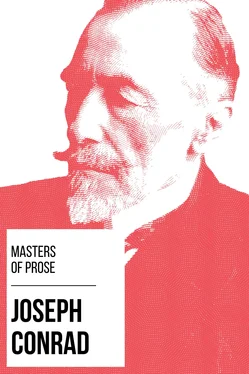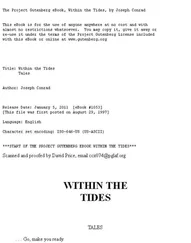“You see,” he interrupted, abruptly, in a very peculiar tone, “the worst of this country is that one is not able to realize . . . it's impossible to realize. . . .” His voice sank into a languid mutter. “And when one has very large interests . . . very important interests . . .” he finished, faintly . . . “up the river.”
We looked at each other. He astonished me by giving a start and making a very queer grimace.
“Well, I must be off,” he burst out, hurriedly. “So long!”
At the moment of stepping over the gangway he checked himself, though, to give me a mumbled invitation to dine at his house that evening with my captain, an invitation which I accepted. I don't think it could have been possible for me to refuse.
I like the worthy folk who will talk to you of the exercise of free-will, “at any rate for practical purposes.” Free, is it? For practical purposes! Bosh! How could I have refused to dine with that man? I did not refuse, simply because I could not refuse. Curiosity, a healthy desire for a change of cooking, common civility, the talk and the smiles of the previous twenty days, every condition of my existence at that moment and place made irresistibly for acceptance; and, crowning all that, there was the ignorance—the ignorance, I say—the fatal want of fore knowledge to counterbalance these imperative conditions of the problem. A refusal would have appeared perverse and insane. Nobody, unless a surly lunatic, would have refused. But if I had not got to know Almayer pretty well it is almost certain there would never have been a line of mine in print.
I accepted then—and I am paying yet the price of my sanity. The possessor of the only flock of geese on the East Coast is responsible for the existence of some fourteen volumes, so far. The number of geese he had called into being under adverse climatic conditions was considerably more than fourteen. The tale of volumes will never overtake the counting of heads, I am safe to say; but my ambitions point not exactly that way, and whatever the pangs the toil of writing has cost me I have always thought kindly of Almayer.
I wonder, had he known anything of it, what his attitude would have been? This is something not to be discovered in this world.
But if we ever meet in the Elysian Fields—where I cannot depict him to myself otherwise than attended in the distance by his flock of geese (birds sacred to Jupiter)—and he addresses me in the stillness of that passionless region, neither light nor darkness, neither sound nor silence, and heaving endlessly with billowy mists from the impalpable multitudes of the swarming dead, I think I know what answer to make.
I would say, after listening courteously to the unvibrating tone of his measured remonstrances, which should not disturb, of course, the solemn eternity of stillness in the least—I would say something like this:
“It is true, Almayer, that in the world below I have converted your name to my own uses. But that is a very small larceny. What's in a name, O Shade? If so much of your old mortal weakness clings to you yet as to make you feel aggrieved (it was the note of your earthly voice, Almayer), then, I entreat you, seek speech without delay with our sublime fellow-Shade—with him who, in his transient existence as a poet, commented upon the smell of the rose. He will comfort you. You came to me stripped of all prestige by men's queer smiles and the disrespectful chatter of every vagrant trader in the Islands. Your name was the common property of the winds; it, as it were, floated naked over the waters about the equator. I wrapped round its unhonoured form the royal mantle of the tropics, and have essayed to put into the hollow sound the very anguish of paternity—feats which you did not demand from me—but remember that all the toil and all the pain were mine. In your earthly life you haunted me, Almayer. Consider that this was taking a great liberty. Since you were always complaining of being lost to the world, you should remember that if I had not believed enough in your existence to let you haunt my rooms in Bessborough Gardens, you would have been much more lost. You affirm that had I been capable of looking at you with a more perfect detachment and a greater simplicity, I might have perceived better the inward marvellousness which, you insist, attended your career upon that tiny pin-point of light, hardly visible far, far below us, where both our graves lie. No doubt! But reflect, O complaining Shade! that this was not so much my fault as your crowning misfortune. I believed in you in the only way it was possible for me to believe. It was not worthy of your merits? So be it. But you were always an unlucky man, Almayer. Nothing was ever quite worthy of you. What made you so real to me was that you held this lofty theory with some force of conviction and with an admirable consistency.”
It is with some such words translated into the proper shadowy expressions that I am prepared to placate Almayer in the Elysian Abode of Shades, since it has come to pass that, having parted many years ago, we are never to meet again in this world.
In the career of the most unliterary of writers, in the sense that literary ambition had never entered the world of his imagination, the coming into existence of the first book is quite an inexplicable event. In my own case I cannot trace it back to any mental or psychological cause which one could point out and hold to. The greatest of my gifts being a consummate capacity for doing nothing, I cannot even point to boredom as a rational stimulus for taking up a pen. The pen, at any rate, was there, and there is nothing wonderful in that. Everybody keeps a pen (the cold steel of our days) in his rooms, in this enlightened age of penny stamps and halfpenny post-cards. In fact, this was the epoch when by means of postcard and pen Mr. Gladstone had made the reputation of a novel or two. And I, too, had a pen rolling about somewhere—the seldom-used, the reluctantly taken-up pen of a sailor ashore, the pen rugged with the dried ink of abandoned attempts, of answers delayed longer than decency permitted, of letters begun with infinite reluctance, and put off suddenly till next day—till next week, as like as not! The neglected, uncared-for pen, flung away at the slightest provocation, and under the stress of dire necessity hunted for without enthusiasm, in a perfunctory, grumpy worry, in the “Where the devil is the beastly thing gone to?” ungracious spirit. Where, indeed! It might have been reposing behind the sofa for a day or so. My landlady's anemic daughter (as Ollendorff would have expressed it), though commendably neat, had a lordly, careless manner of approaching her domestic duties. Or it might even be resting delicately poised on its point by the side of the table-leg, and when picked up show a gaping, inefficient beak which would have discouraged any man of literary instincts. But not me! “Never mind. This will do.”
O days without guile! If anybody had told me then that a devoted household, having a generally exaggerated idea of my talents and importance, would be put into a state of tremor and flurry by the fuss I would make because of a suspicion that somebody had touched my sacrosanct pen of authorship, I would have never deigned as much as the contemptuous smile of unbelief. There are imaginings too unlikely for any kind of notice, too wild for indulgence itself, too absurd for a smile. Perhaps, had that seer of the future been a friend, I should have been secretly saddened. “Alas!” I would have thought, looking at him with an unmoved face, “the poor fellow is going mad.”
I would have been, without doubt, saddened; for in this world where the journalists read the signs of the sky, and the wind of heaven itself, blowing where it listeth, does so under the prophetical management of the meteorological office, but where the secret of human hearts cannot be captured by prying or praying, it was infinitely more likely that the sanest of my friends should nurse the germ of incipient madness than that I should turn into a writer of tales.
Читать дальше












